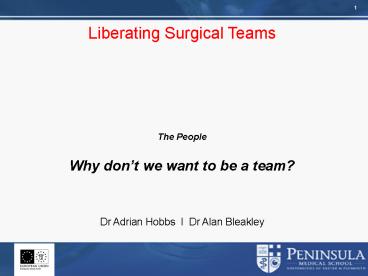Liberating Surgical Teams - PowerPoint PPT Presentation
1 / 16
Title:
Liberating Surgical Teams
Description:
Mr Paul Peyser - Consultant GI Surgeon, RCH, Truro ... Coffee room brief. 5. What if this was a high risk industry? 6. Why did they change? Accidents ... – PowerPoint PPT presentation
Number of Views:62
Avg rating:3.0/5.0
Title: Liberating Surgical Teams
1
Liberating Surgical Teams The People Why
dont we want to be a team?
Dr Adrian Hobbs I Dr Alan Bleakley
2
Theatre Team Resource Management (TTRM)
projectRoyal Cornwall Hospitals Trust
Peninsula Medical School
- Improving patient safety and operating theatre
efficiency - Dr Alan Bleakley Reader in Clinical Education,
Peninsula Medical School - Dr Adrian Hobbs Consultant Anaesthetist, Royal
Cornwall Hospital, Truro - Dr Tony Simcock retired Consultant
Anaesthetist, RCH, Truro - Dr Paul Rich - Consultant Anaesthetist, RCH,
Truro - Mr Paul Peyser - Consultant GI Surgeon, RCH,
Truro - Mr Jon Allard Research Fellow, Peninsula
Medical School - Mrs Linda Walsh Theatres Manager, RCH, Truro
- Turning a team of experts into an expert team
3
Does the day in your hospital ever start like
this?
4
Coffee room brief
5
What if this was a high risk industry?
6
Why did they change?
- Accidents
- Aviation - 1972 Staines air crash
- Nuclear - 1979 Three Mile Island
- Space - 1986 Challenger space shuttle
- Shipping - 1987 Zeebrugge ferry
- Off-shore oil - 1988 Piper Alpha
- Rail - 1999 Paddington
7
They became High Reliability Organisations by
- Changing their cultures
- Increasing organisational transparency
- Introducing
- - human factors education
- - briefing debriefing for all procedures (10
min overall, 30 sec pre-procedure) - - confidential near-miss reporting systems
(feedback, responsive) - Simulators
8
Root cause
- 75-80 of errors are grounded in non-technical
systems errors, where the basic system is the
clinical team - Cognitive skills
- Decision making
- Conflict resolution
- Situational awareness
- Social skills
- Teamworking
- Interpersonal communication
- Leadership followership What is right, not
who is right
9
Why havent we done the same in medicine?
- Drip drip vs. one jumbo every three days
- Blame cultures
- Non-transparent practices
- Traditional hierarchies
- - tribalism / silo mentality
- - stereotyping and simplifying others roles
- - multiprofessional vs. interprofessional
10
Average rate per exposure of catastrophes and
associated deaths in various industries and human
activities
Surgery
Amalberti, R. et. al. Ann Intern Med
2005142756-764
Amalberti, R. et. al. Ann Intern Med
2005142756-764
11
Components of TTRM
- Human factors (non-technical skills) education
- Team Self-Review (briefing debriefing)
- Close-Call Reporting
- Assessment
- SAQ
- Questionnaires
- In-depth interviews
- Debriefing logs close-call reports
- (Late starts, early finishes, sickness rates not
used)
12
Safety Attitudes Questionnaire
13
Time out
14
Communication and situational awareness
- Nine utterances.
- Seven statements.
- Two hostile rhetorical questions.
- Team communication is established through
dialogue not monologue
15
Communication site of tension time versus task
- Im off at 5 we dont have time to do the last
case - Surgeons - finish the task
- Scrub team - finish the shift (time)
- Anaesthetists - increasingly time oriented
- Result conflict
16
Answer Briefing, to establish situational
awareness
- Whos on the team today? (affective/ morale/
teambuilding) setting a climate for dialogue
rather than monologue - 2. Preparation (do we have the kit? Will we have
the time?) - 3. Situational awareness (cognitive/ are we all
singing from the same song sheet?)
Who is in the team? What are we doing? Do we
have the kit? Any outside issues? Time?































